 Petzlover
Petzlover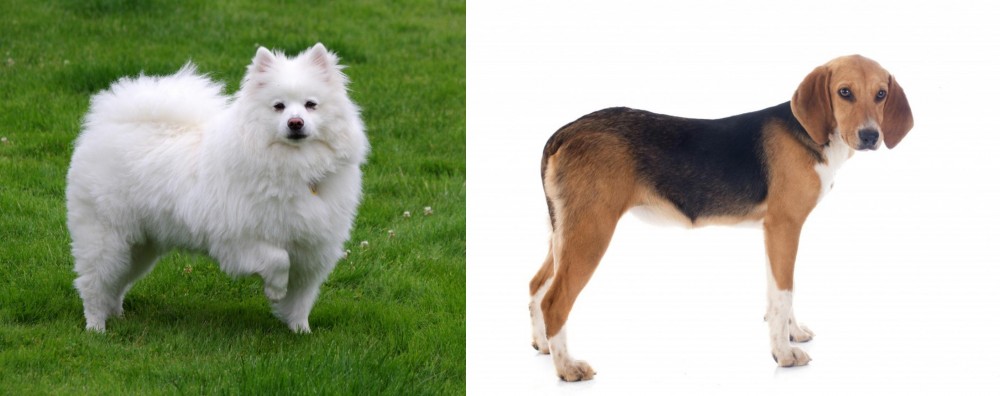 American Eskimo Dog is originated from United States but Beagle-Harrier is originated from France. Both American Eskimo Dog and Beagle-Harrier are having almost same height. American Eskimo Dog may weigh 9 kg / 19 pounds lesser than Beagle-Harrier. American Eskimo Dog may live 3 years more than Beagle-Harrier. American Eskimo Dog may have less litter size than Beagle-Harrier. American Eskimo Dog requires High Maintenance. But Beagle-Harrier requires Moderate Maintenance
American Eskimo Dog is originated from United States but Beagle-Harrier is originated from France. Both American Eskimo Dog and Beagle-Harrier are having almost same height. American Eskimo Dog may weigh 9 kg / 19 pounds lesser than Beagle-Harrier. American Eskimo Dog may live 3 years more than Beagle-Harrier. American Eskimo Dog may have less litter size than Beagle-Harrier. American Eskimo Dog requires High Maintenance. But Beagle-Harrier requires Moderate Maintenance
 The American Eskimo is derived from the Nordic Spitz breed and most closely related to the German Spitz in particular. There were many German Spitzes in the United States at the time of the second World War and anti-German sentiment caused its name to change to the American Eskimo Dog. However, as the breed developed over time in the States, the American Eskimo became its own separate breed. In addition to the German Spitz, the American Eskimo is also related to the white Keeshond, the Samoyed, the white Italian Spitz and the white Pomeranian.
The history is beginning to show that the Spitzes that were brought to the US in the early 1900’s was white. This color was not popular in Europe but was quickly the favorite in the United States. They were originally working dogs on farms and ranches. They have excellent herding instincts, make goo watch and guard dogs, and good law enforcement sniff dogs. However, their first introduction to the American public was through the Cooper Brothers’ Railroad Circus and Stout’s Pal Pierre at the Barnum and Baily Circus. Eskimo puppies were sold after the circus show.
The American Eskimo is derived from the Nordic Spitz breed and most closely related to the German Spitz in particular. There were many German Spitzes in the United States at the time of the second World War and anti-German sentiment caused its name to change to the American Eskimo Dog. However, as the breed developed over time in the States, the American Eskimo became its own separate breed. In addition to the German Spitz, the American Eskimo is also related to the white Keeshond, the Samoyed, the white Italian Spitz and the white Pomeranian.
The history is beginning to show that the Spitzes that were brought to the US in the early 1900’s was white. This color was not popular in Europe but was quickly the favorite in the United States. They were originally working dogs on farms and ranches. They have excellent herding instincts, make goo watch and guard dogs, and good law enforcement sniff dogs. However, their first introduction to the American public was through the Cooper Brothers’ Railroad Circus and Stout’s Pal Pierre at the Barnum and Baily Circus. Eskimo puppies were sold after the circus show.
It was then that the breed became one of America’s favorite breeds and they quickly became house pets. Following World War II, Japan exported the Japanese Spitz into America and it was crossed with the Eskimo also. The American Eskimo Dog breed was not recognized by AKC until 1985. Still in 1958 there was no official breed club in the States but there were growing numbers of the dogs. It was not until 1970 did the National American Eskimo Dog Association (NAEDA) come into being. They collected the pedigrees of the first 1750 dogs to be AKC registered.
Since the American Eskimo Dog is not recognized internationally, those wishing to participate in international competition such as England’s prestigious Cruft’s Dog Show must register their dogs a German Spitz. Despite this the American Eskimo and German Spitz remain two very different breeds.
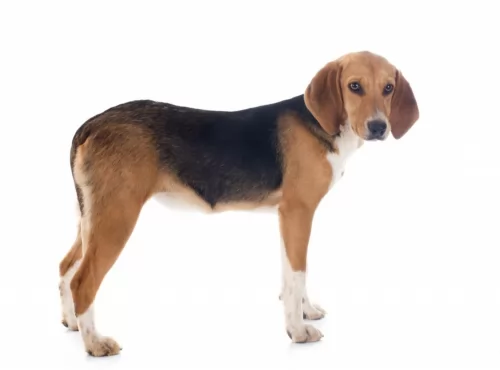 The Beagle Harrier, the breed that was made mixing the France Scent Hounds and a Beagle.
It is not quite sure if this breed was made on purpose or the mix of the breeds happened and resulted in a great dog so the breeding continued.
Since they are not large dogs as hounds, they are used to hunt small animals.
The Beagle Harrier, the breed that was made mixing the France Scent Hounds and a Beagle.
It is not quite sure if this breed was made on purpose or the mix of the breeds happened and resulted in a great dog so the breeding continued.
Since they are not large dogs as hounds, they are used to hunt small animals.
This first breeding took place in England, but after the 14th century, they were breed on purpose in France.
 This small to medium dog is beautiful and resembles a miniature Samoyed. There are three sizes of American Eskimo – the standard, miniature, and the toy. The Eskimo’s head is wedge shaped with tall, triangular, erect ears. It has a heavily plumed tail with a sharp curl over the back. The Eskimo can burst into bold action due to their good legs and feet.
This small to medium dog is beautiful and resembles a miniature Samoyed. There are three sizes of American Eskimo – the standard, miniature, and the toy. The Eskimo’s head is wedge shaped with tall, triangular, erect ears. It has a heavily plumed tail with a sharp curl over the back. The Eskimo can burst into bold action due to their good legs and feet.
The coat is a double one with a harsh outer coat and plush inner one. The coat is always white or white with cream or biscuit markings, and visible skin in gray or pink. The American Eskimo’s ruff or mane is very heavy, and the nose, eyelids, pads and gums are black. They have dark eyes and blue are not allowed.
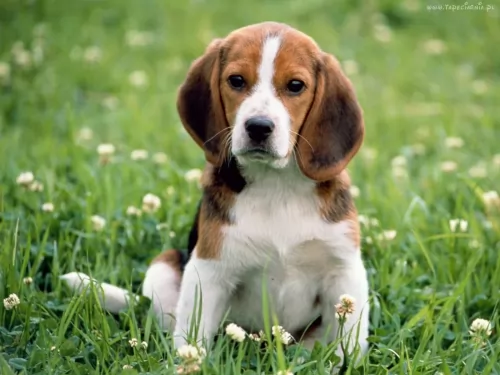 The Beagle Harrier is a scent hound that is described as a big sized Beagle or a small sized Harrier. This breed was developed from this two breeds, actually. Despite the looks of these breeds, the Beagle Harrier is an energetic kind of dog who gets very attached to his family. This medium sized pet comes in variations of colours and they are usually tricoloured. They usually have dark coloured eyes, white paws, and They usually grow up to have a very muscular body, but, if you don’t provide them with the daily activity they need, they will quickly get obese and unhappy.
The Beagle Harrier is a scent hound that is described as a big sized Beagle or a small sized Harrier. This breed was developed from this two breeds, actually. Despite the looks of these breeds, the Beagle Harrier is an energetic kind of dog who gets very attached to his family. This medium sized pet comes in variations of colours and they are usually tricoloured. They usually have dark coloured eyes, white paws, and They usually grow up to have a very muscular body, but, if you don’t provide them with the daily activity they need, they will quickly get obese and unhappy.
 The Eskimo is affectionate, playful and love children of all ages. They are intelligent and want to please you. They can be trained easily and are champions of the obedience trial. They are fun and confident. At the same time, they need a confident pack leader. He is prone to Little Dog Syndrome where the dog thinks they oversee the home and display all sorts of behaviors. Under these circumstances the American Eskimo can become obsessive, aggressive, and engaging in obsessive resource guarding and barking.
The Eskimo is affectionate, playful and love children of all ages. They are intelligent and want to please you. They can be trained easily and are champions of the obedience trial. They are fun and confident. At the same time, they need a confident pack leader. He is prone to Little Dog Syndrome where the dog thinks they oversee the home and display all sorts of behaviors. Under these circumstances the American Eskimo can become obsessive, aggressive, and engaging in obsessive resource guarding and barking.
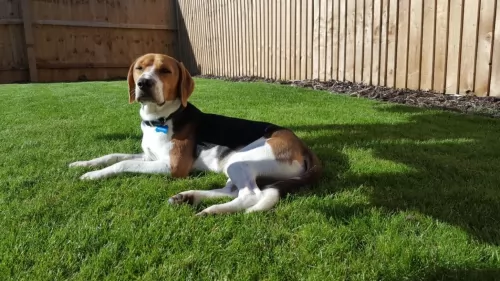 The Beagle Harrier, if trained properly and socialized while he was still a pup, will be the great playmate for any child. They get along with strangers, as well. We might say that they will get along with anybody who is ready to run and play with him. Children are most likely that kind of playdate, so it appears that they like children more. The Beagle Harrier is a great family pet, and he is great with babies, toddlers, teenagers… so don’t be afraid to leave the dog alone during the playdate!
The Beagle Harrier, if trained properly and socialized while he was still a pup, will be the great playmate for any child. They get along with strangers, as well. We might say that they will get along with anybody who is ready to run and play with him. Children are most likely that kind of playdate, so it appears that they like children more. The Beagle Harrier is a great family pet, and he is great with babies, toddlers, teenagers… so don’t be afraid to leave the dog alone during the playdate!
hunting, scent tracking, search dog
Some will say that the Beagle Harrier is one of the most desirable pets because of his loving and lively nature. They get along with almost anyone and they don’t mind living indoors if you have the time to take him out for a daily run each day. They will do great in a large group of people and any public places so you can take your Beagle Harrier with you anywhere you go.
Since the Beagle Harrier is placed in a group of the hound dogs, you must be aware that he will have the attitude of the pack leader. Once you got the Beagle Harrier puppy, you must start training and socializing him in order to grow the pet that will be easy to handle and accepted by the family and all the people around you, even strangers. They are very intelligent and they have a calm nature so they will be quite easy to train.
 The American Eskimo Dog is prone to hip dysplasia. Their eyes and tear ducts are potential issues with progressive retinal atrophy. They are allergic to fleas and have a tendency to be overweight.
The American Eskimo Dog is prone to hip dysplasia. Their eyes and tear ducts are potential issues with progressive retinal atrophy. They are allergic to fleas and have a tendency to be overweight.
We deal with PRA (Progressive Retinal Atrophy) in greater detain in a following section but it is not as destructive as it used to be. It is much more treatable now.
There are potentially some dental issues that some American Eskimo Dogs are prone to.
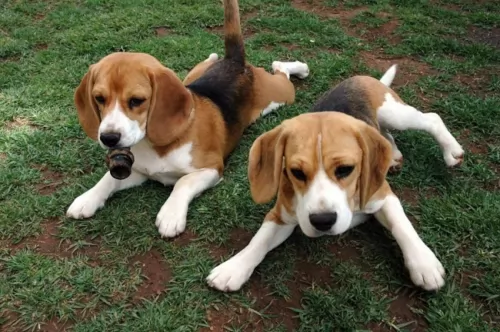 Almost every active dog suffers from joint diseases. Even though it’s generally a genetic disease, you can lower the chances of hip or elbow dysplasia by taking care of your dog’s weight, diet and daily exercise.
Almost every active dog suffers from joint diseases. Even though it’s generally a genetic disease, you can lower the chances of hip or elbow dysplasia by taking care of your dog’s weight, diet and daily exercise.
The Beagle Harrier has big ears that are always set down. That makes them ideal for the dirt accumulation, ear irritations and ear infections. Check his ears regularly and clean them at least once a week.
 Your American Eskimo Dog needs a high quality food so they will not get overweight. Make sure you know how much is appropriate for your particular dog and her specific age. The puppies should be fed twice a day but adults only once.
Your American Eskimo Dog needs a high quality food so they will not get overweight. Make sure you know how much is appropriate for your particular dog and her specific age. The puppies should be fed twice a day but adults only once.
As previously mentioned the American Eskimo Dog is prone to eye issue such as Progressive Retinal Atrophy or (PRA) – this disease is inherited and used to cause blindness as the rods in the retina died. New medical discoveries mean this is no longer a hopeless disease. Their eyes are also susceptible to other issues so make sure you check them and the tear ducts regularly.
Like so many other breeds the American Eskimo is also susceptible to hip dysplasia and a moving patella in the knee. For this reason watch their weight. They can also be very allergic.
This small dog has more energy than his size can handle. He needs a lot of exercise and a place to run. If he will become hyperactive and destructive. They are prone to disturbing behaviors such as spinning (spinning in circles) when they don’t get enough exercise. The American Eskimo Dog is smart and agile, Play games like catch or agility. They are also great at herding, competitive obedience or detection.
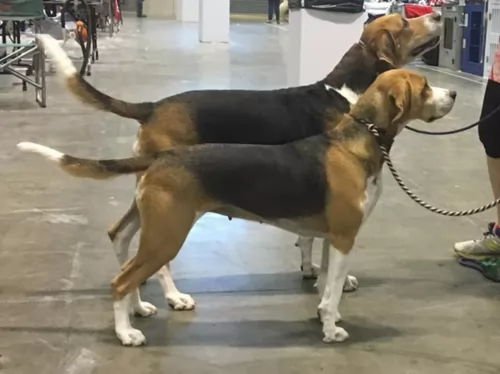 Since the Beagle Harrier is an active dog breed, they will need food for the active dogs. Make sure you provide them with quality food that will give them enough strength to get through the very active day, and not gain too much of the weight. It is very important that you don’t overfeed him because this breed quickly becomes obese. It is advisable to use treats while you train him to do new tricks, but be very careful with the amount you give to the dog.
Since the Beagle Harrier is an active dog breed, they will need food for the active dogs. Make sure you provide them with quality food that will give them enough strength to get through the very active day, and not gain too much of the weight. It is very important that you don’t overfeed him because this breed quickly becomes obese. It is advisable to use treats while you train him to do new tricks, but be very careful with the amount you give to the dog.
Puppies need to be fed only two times a day. Once you decide which brand of food you will use, stick with them until the dog is 6 months old. Make sure they have enough nutrients and the quality ingredients that will help them with growing strong and healthy bones.
If you want Beagle Harrier to grow up in a happy and healthy dog, make sure you provide him with quality food, lots of exercises and unconditional love. They are extremely loving and they get depressed if left alone. Grooming tips are very clear – they need a regular brush because shed a lot. The more you brush, the less hair you will find on your hands during the belly rubs.
If your Beagle Harrier is trained and socialized, the dog park will be the best daily activity for him. If there is no dog park near your house, take him to the bike ride, jogging, swimming, hiking, markets, parks… They love to be off the leash and with people but since they are the hound dogs, don’t be surprised if they get distracted by smelling something more interesting than the ball. They would love to grow up in a house with a large yard, but, if you live in the apartment, make sure that you take time for his daily activity.